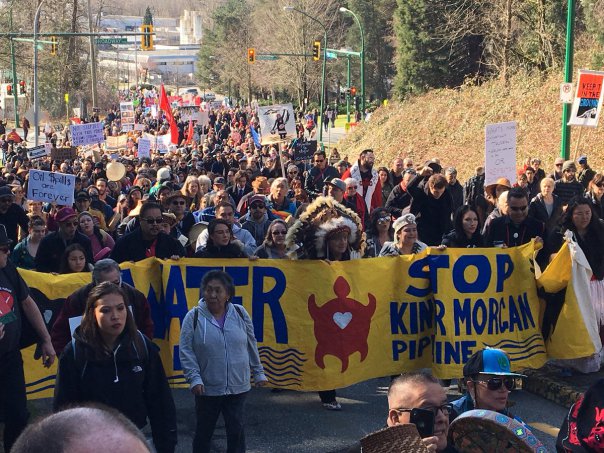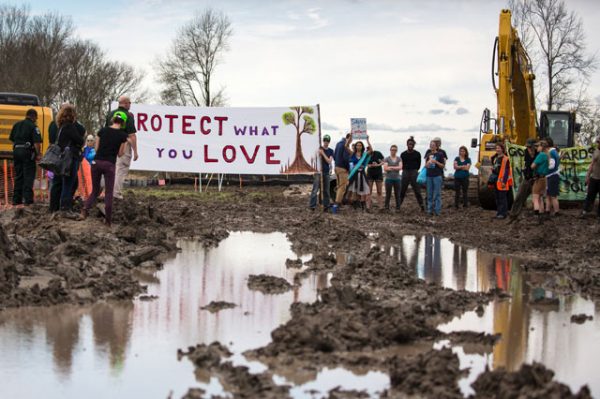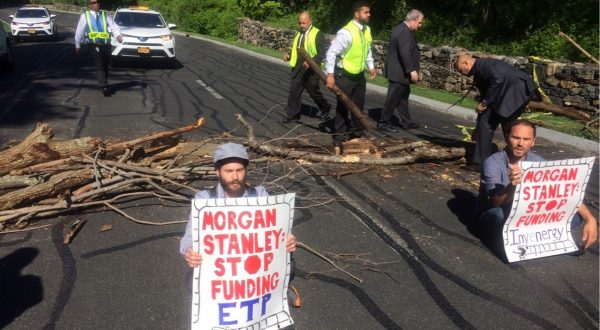Stopping Pipelines Means Challenging Systems That Threaten Our Existence
Although not as well-known as the struggle at Standing Rock to stop the Dakota Access Pipeline, there are bold and active campaigns going on to stop pipelines from British Columbia to the Bayou to the Appalachian Mountains. If constructed, the pipelines will contaminate the water and food upon which indigenous and poor communities depend. They will unleash the extraction of vast amounts of carbon at a time when there is a desperate need to reduce climate emissions.
The pipelines being built and the processes being used to permit them illustrate deeper crises of capitalism, colonialism, and democracy. They stand in the way of adequate actions being taken to address the growing climate and environmental crises. Examining the political environment helps us understand these crises and how to be more effective in challenging systems that threaten our existence.
Resistance to the Kinder Morgan Pipeline
The United States-based corporation Kinder Morgan has been trying for years to build the Trans-Mountain pipeline that would carry tar sands bitumen from Edmonton, Alberta to Vancouver, British Columbia for export. It would triple the extraction of tar sands, the most polluting form of extraction, if completed.
The pipeline would cross 1,335 waterways. Last year, the Tsleil-Waututh, Squamish and Coldwater Indian First Nations sued Kinder Morgan to stop the pipeline. The pipeline is being built without their consent and threatens their aquifers, fishing, and economy. There are other indigenous and non-indigenous legal challenges to the pipeline as well.
Resistance to the Kinder Morgan pipeline is strong. A broad alliance of First Nations and non-indigenous groups are organizing opposition. There have been rallies and marches, solidarity actions, weeks of consecutive blockades at construction sites and the Tiny House Warriors have built small structures on the proposed pipeline route. The British Columbia government is suing the federal government over the project.
In April, Kinder Morgan said that it would stop all non-essential spending on the pipeline project until May 31, when it would decide whether or not to proceed. On June 1, the Trudeau government announced that it would buy the pipeline for $4.5 billion. That deal will be completed in August. Activists immediately started targeting the Prime Minister and members of Parliament to oppose completion of the project.
Pipeline opponents point out that the $4.5 billion price tag of the pipeline is more than the $3.2 billion investment currently needed to protect First Nation’s water supplies and that instead of protecting the water, the government is putting it at more risk.
The Trans-Mountain Pipeline project has created a conflict between the Alberta government, which claims that it needs the oil jobs and revenue, and the British Columbia (BC) government, which opposes the environmental impacts of the pipeline. Alberta recently passed a law suspending oil and gas supplies to BC, which BC is challenging.
Trudeau has always been a supporter of the pipeline, even though it conflicts with his stated support for the Paris Climate Agreement. One reason may be a trade agreement between Canada and China, the Foreign Investment Promotion and Protection Agreement (FIPA), which protects China’s investments in tar sands. Under the investment dispute process, China could sue Canada for failure to build the pipeline, just as Canada sued the US for $15 billion when the northern portion of the Keystone project was denied.
Issues at the center of the Trans-Mountain Pipeline project are Indigenous sovereignty, colonialism, the environment and climate crisis, jobs and the economy and the power of corporations, especially their rights to sue governments through trade tribunals.
Theo LeQuesne, who is working in solidarity with the pipeline opposition, has an excellent analysis of the political environment and resistance. LeQuesne compares the Kinder Morgan resistance to the resistance in Standing Rock. So far the Trudeau government has pursued a “liberal approach” to the project, using public institutions to permit it and building public support for the project while minimizing conflicts between protesters and the security state. The approach may become more repressive as the opposition intensifies.
Energy Transfer Partners ignores the Courts
Energy Transfer Partners (ETP), the company that built the Dakota Access Pipeline, is now building the Bayou Bridge Pipeline, which would carry oil from the Dakota Access Pipeline to refineries in the Gulf of Mexico. It crosses 162 miles, much of it fragile wetlands, and would add to the already-toxic “cancer alley” in southern Louisiana that poisons poor communities.
Cherri Foytlin, a long time defender of people and the planet, helped to start a resistance camp, L’Eau est la Vie (Water is Life), early on in the fight against the Bayou Bridge Pipeline. Opponents intervened at every possible point to stop the pipeline, from the permitting agencies to the courts to physically stopping construction, and won a victory recently when Judge Alvin Turner ordered the Department of Natural Resources to require ETP to develop plans to protect the community and the environment.
Despite the court ruling, construction of the Bayou Bridge Pipeline continues and is, in fact, being rushed. Water protectors are taking actions to deliver the judge’s orders to the construction sites and are being arrested for doing so. In a democracy, the government would stop ETP from continuing construction instead of arresting those who do the government’s job of informing the workers. In a functioning government, a corporation would not be permitted to build an oil pipeline without first being required to prove that no harm would be done to communities and the environment.
Mountain Valley Pipeline Permit Suspended
Appalachians Against Pipelines and other allies have conducted a strong campaign to stop construction of the Mountain Valley Pipeline that would carry fracked gas three hundred miles from the Marcellus and Utica shales through West Virginia and Virginia. In March, tree sits were constructed along the construction site on Peter Mountain. This inspired others to create tree sits at other sites, including a mother and daughter who stayed up in trees on their property, which was seized through eminent domain, for over thirty days. In all, there were nine blockades.
Public opposition to the pipeline grew significantly when it was exposed that the forest service and police took action to prevent supporters from providing supplies such as food and water to the tree-sitters, placing their lives in jeopardy. Even the Geneva Convention prevents the withholding of food and water from prisoners, but the police were allowed to block the tree-sitters from receiving basic necessities.
All of the tree-sits have been dismantled at present. The longest sit, on a monopod, was 57 days by a person called “Nutty.” For the final three days, Nutty was out of food. Prior to that, Nutty ate a small amount only once a day.
Other opponents to the pipeline documented and exposed problems related to its construction, including mudslides, some of which blocked roadways, and pollution in waterways. Finally, the state of Virginia halted construction of one area of the pipeline after local residents filed a lawsuit. The US Army Corps of Engineers also suspended work on the pipeline in West Virginia until they can assure that it is in compliance with state law.
Activists involved in resistance to the Mountain Valley Pipeline are clear that the fight is greater than protecting their local communities. When Nutty ended the monopod sit, she said, “[I] am committed to continuing to participate in the global struggle against the processes of violent extraction, and against the structures of colonization, capitalism, white supremacy, and patriarchy it feeds.” Others also point to the corporate domination of government and the fact that they are on land stolen from Native Americans during the American Genocide.
Deep Problems Require Deep Solutions
To end the fossil fuel era and create a cleaner and more sustainable future, we are not only challenging dirty energy but capitalism, colonization and corporate power. Each of the pipeline fights described above is making progress, but still have considerable fights ahead. It is important to recognize that in these struggles, we must also educate ourselves about and dismantle oppressive systems.
We must also know what we are up against. Oil and gas companies will lie, violate laws and endanger the lives of protesters to make a profit. Just as activists are thinking and acting strategically, the oil companies are also looking for ways to counter our efforts. One way they do this is to create false grassroots support for fossil fuel projects. In Grist, Greta Jochem describes how oil and gas companies hire public relations firms that use tactics such as hiring supporters, e.g. Crowd for Hire, to testify at public hearings in favor of projects and forging letters.
We also need to evaluate whether or not the tactics we use are having the impact we desire. For years now, activists have encouraged institutions, banks, and investors to divest from oil and gas companies. Some headway has been made, but a new study by Robert Pollin of the Political Economy Research Institute finds that so far divestment has not had an effect on reducing carbon emissions. Pollin predicts that they are unlikely to have an impact in the future as long as there is another investor willing to support the projects. However, divestment campaigns do increase awareness of the climate crisis and may convince investors that they could be held accountable for it or be left with stranded assets.
Given the relatively short amount of time we have to reduce carbon emissions, it may make more sense to focus on local campaigns to move to renewable energy and increase energy efficiency. This can be done in ways that transition workers and communities to the new energy economy. A Green New Deal will provide more and healthier jobs than the current dirty energy economy. Students for Climate Action is a group that is having success in getting schools to recognize the climate crisis and reduce their climate impact.
The climate crisis is a result of ongoing colonization – the violation of treaties and indigenous rights, the exclusion of indigenous peoples from decision-making processes, the lack of investment in protecting the air, land and water and the lack of regard for the lives of colonized people.
A new report on the death toll in Puerto Rico from Hurricane Maria finds that at least 4,645 people died, more than died in the 9/11 events, but there is little outrage or national response. After the hurricane, the governments of Puerto Rico and the US failed to put systems in place to ensure that people who relied on oxygen therapy, kidney dialysis, and other life-saving treatment had access to care, and so they died. We did not hear stories of this happening in Houston after it was hit.
The climate crisis is also the result of corporate control of public agencies and elected officials at every level of government. The Environmental Protection Agency (EPA) has recently come under attack due to the excesses of the current head, Scott Pruitt. In reality, the EPA has a long history of suppressing science and placing the public at risk. The EPA requires a total makeover so that it is accountable and serves the public interest.
The Federal Energy Regulatory Commission (FERC), which permits oil and gas projects, also requires a makeover. Beyond Extreme Energy (BXE) has been targeting the FERC for years and is starting to see positive effects. BXE is planning to escalate its actions to “Crack the FERC Open” this month. An action camp and actions will be held June 23 to 25 in Washington, DC.
[The Poor People’s Campaign march in Washington will also be on June 23. Join the Popular Resistance HOPE campaign healthcare contingent in the march.]
As we take action to stop fossil fuel projects and move to a cleaner and more sustainable way of living, let’s remember the deep crises that we face and recognize that our future depends on addressing colonization, capitalism and other oppressive systems.
Source Article from https://popularresistance.org/challenging-systems-threaten-existence/
Related posts:
Views: 0
 RSS Feed
RSS Feed

















 June 4th, 2018
June 4th, 2018  Awake Goy
Awake Goy 



 Posted in
Posted in  Tags:
Tags: 
















